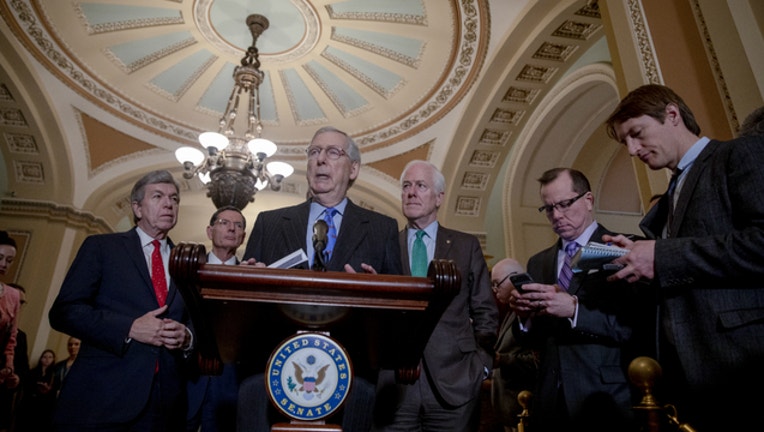Senate to vote on stopgap bill to avert government shutdown

Senate Majority Leader Mitch McConnell, (R-KY) speaks during a during a news conference after a GOP caucus meeting on December 18, 2018 in Washington, DC. (Photo by Tasos Katopodis/Getty Images)
WASHINGTON (AP) - The Senate prepared to vote Wednesday to avert a federal shutdown and keep the government funded into February after President Donald Trump backed off his demand for money for a border wall with Mexico.
Senate Majority Leader Mitch McConnell, R-Ky., said the short-term spending measure was a "simple" bill that would show Republicans, who control Congress now, will finish the year by not prolonging a potential crisis. It would provide money to keep the government running to Feb. 8.
"Republicans will continue to fill our duty to govern," McConnell said.
With the Senate on track to approve the measure, it would next go to the House, where lawmakers were returning to session late Wednesday evening. Votes were uncertain there, but approval was expected before Friday's deadline, when federal funding for a portion of the government expires. Democratic Leader Nancy Pelosi signaled support.
The swift pace in Congress came after Trump moved off his demand. Trump has not said that he would sign such a temporary measure, but White House counselor Kellyanne Conway on Wednesday said "he'll take a look at that certainly."
On Twitter, Trump appeared to respond to criticism that he was retreating. He insisted that "one way or the other, we will win on the Wall!"
Should the legislation become law, the border money fight would drag into the next Congress, which could prove even more difficult for Trump with a Democratic-led House.
Pelosi, who is poised to become House speaker, will probably be able to quickly win approval of a longer-term measure to keep government running in 2019.
"Democrats will be ready to fully, responsibly fund our government in January," Pelosi said in a statement.
Democratic Rep. Nita Lowey of New York, who will take over as Appropriations Committee chairwoman, said she was disappointed that Trump and the Republican Congress "couldn't even complete their final task of funding the government" and instead chose to "kick the can down the road for a third time."
McConnell, on the other hand, lashed out at Democrats for failing to give Trump any of the $5 billion that he wanted for the wall.
"This seems to be the reality of our political moment," McConnell said. "It seems like political spite for the president may be winning out over sensible policy."
Senate Minority leader Chuck Schumer of New York said Democrats oppose Trump's border demands because the wall is "inefficient" and because Trump, as a candidate, promised that Mexico would pay for it, which Mexico has refused to do.
"We want smart, effective border security," Schumer said. "That's not a wall."
More than 800,000 government workers are facing the prospect of being furloughed or sent to work without pay beginning at midnight Friday, disrupting government operations days before Christmas. Congress often approves pay for such affected workers retroactively, even if they were ordered to stay home.
Just last week, at a televised meeting at the White House, Trump said he would be "proud" to shut the government down over the wall.
But the White House showed its willingness to budge as it became apparent the president did not have support in Congress for paying for the wall at the $5 billion level.
The White House press secretary, Sarah Huckabee Sanders, indicated that Trump did not want to shut down the government and said the administration was looking at ways to find the money elsewhere.
The stopgap measure would approve government funding at existing levels for the next several weeks, without a boost for the border. It would include a temporary extension of a national flood insurance program, the Violence Against Women Act and other measures.
At issue in the standoff is money for nine of 15 Cabinet-level departments and dozens of agencies, including the departments of Homeland Security, Transportation, Interior, Agriculture, State and Justice, as well as national parks and forests.
Congress did pass legislation to fund much of the government through the current budget year, until next Oct. 1.
Many agencies, including the Pentagon and the departments of Veterans Affairs and Health and Human Services, are covered for the year and would continue to operate as usual. The U.S. Postal Service, busy delivering packages for the holiday season, would not be affected by any government shutdown because it's an independent agency.
___
Associated Press writer Laurie Kellman in Washington contributed to this report.

